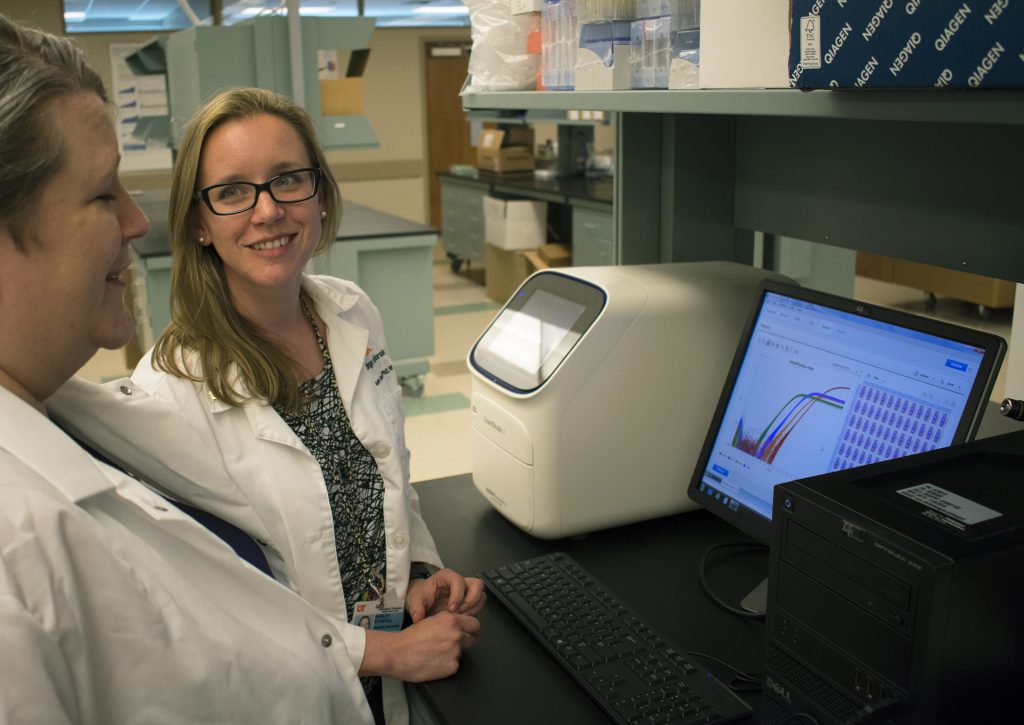
When it comes to scientific research, it is not uncommon for investigators to be collaborating only with other researchers from within their own lab, department, or College. According to Glen E. Palmer, PhD, associate professor in the College of Pharmacy at the University of Tennessee Health Science Center (UTHSC), the Collaborative Research Network (CORNET) Awards are designed to break down these research silos at UTHSC and beyond.
“What is clever about the CORNET program is that it provides incentives and actively promotes intellectual engagement between the research faculty in different departments, and between investigators with dissimilar expertise,” Dr. Palmer said. “This has forged a large number of new inter-departmental collaborations that have elevated the quality of science conducted at UTHSC and leveraged our collective expertise to create an entirely new set of research opportunities.”
Launched in 2016 by Steven R. Goodman, PhD, vice chancellor for Research at UTHSC, the CORNET Awards have been the catalyst of multiple collaborative partnerships between researchers at UTHSC internally and across Tennessee, with various academic institutions regionally and globally, and with industry partners. To date, the CORNET Awards program has provided more than $1.5 million in funding to new teams of researchers at UTHSC, giving rise to over $12.2 million in extramural funding.
“The CORNET awards are primarily aimed at creating new research partnerships and programs,” said Dr. Goodman. “Although on rare occasions, I provide small VCR CORNETS to solve a specific need for an existing research team.”

Brian Peters, PhD, assistant professor in the Department of Clinical Pharmacy and Translational Science in the College of Pharmacy at UTHSC, was recently awarded $418,000 from the National Institutes of Health (NIH) for his project entitled, “Targeted and forward genetic approaches to decipher the pathogenesis of symptomatic vulvovaginal candidiasis” which aims to discover the pathological interplay between Candida albicans, the primary causative agent of fungal vaginitis in women, and host genetics in eliciting inflammation during vaginitis. Dr. Peters credits his CORNET Award as the catalyst for his new collaborative research relationships and tie to his new extramural funding.
“Our pocket CORNET funding expanded my research program by opening new avenues for collaborative efforts and application of new techniques to ongoing laboratory interests, including the pathogenesis of vulvovaginal candidiasis,” said Dr. Peters. “Teaming with Dr. Yan Cui of the Department of Genetics, Genomics, and Informatics (a member of our CORNET group) led to the successful funding of an NIH R21 award focused on dissecting host genetic mechanisms contributing to exacerbated pathology during vaginitis. The CORNET award was instrumental in providing financial and collaborative resources for project development and grant submission.”
SUPPORTING NOVEL COLLABORATIVE RESEARCH
Under CORNET program, UTHSC researchers can apply for seed funding to advance their collaborative research projects. Ansley Stanfill, PhD, RN, assistant professor and interim associate Dean for Research in the College of Nursing at UTHSC was among the first researchers to successfully receive extramural funding due to her CORNET Award support. She explains that the program provided a “protected opportunity for me to explore new research ideas,” said Dr. Stanfill.

“The data generated from my project was integral in helping me to obtain my first R01 award, and will be used for several other large-scale federal and foundation grant applications in the coming years. At the university level, these awards promote targeted multidisciplinary and collaborative research in a way that is sure to grow our school’s national reputation,” said Dr. Stanfill.
Dr. Palmer, who has been the recipient of two different CORNET Awards leading to him obtaining of over $1.4 million from NIH for his project entitled, “Broad spectrum antifungals targeting fatty acid biosynthesis,” echoes Dr. Stanfill’s thoughts. He adds that through the program he was able to take advantage of the shared resources of Birmingham-based Southern Research and UTHSC to facilitate drug discovery and development efforts aimed at any disease, specifically, life-threatening fungal infections.
“The CORNET funding enabled me to bring in personnel to expand the technical expertise within my lab, and produce preliminary data for three new grant applications to date, with more to follow,” said Dr. Palmer whose research is focused on the development of new antimicrobial drugs for the treatment of what are often fatal invasive fungal infections. “My CORNET funding has brought the know-how and experience needed to progress the experimental therapeutics my lab discovers towards new and improved drugs to ultimately improve the prognoses of patients with life-threatening invasive fungal infections. This kind of support through the CORNET program has energized the research faculty at UTHSC.”
CRAFTING A NEW FUTURE FOR UTHSC RESEARCH

UTHSC has made strategic efforts to transform the research enterprise of the university in recent years. With the university’s Operational Strategic Plan for Research leading the way, UTHSC has invested resources into several new initiatives designed to further the reach and scope of its research footprint. The UTHSC Innovation Lab space, for example, was created in order to better support faculty researchers in their entrepreneurial ventures. A partnership with Memphis Bioworks Foundation, the 420 square-foot turnkey space was first occupied by Monica Jablonski, PhD, professor in the Department of Ophthalmology in the College of Medicine at UTHSC, for 12 months. Dr. Jablonski, also a CORNET awardee and recent recipient of a roughly $1.5 million NIH award stemming from her seed funding, used the lab to further develop an ophthalmic microemulsion designed to combat the shortcomings traditionally linked to standard eye drops and improve treatment efficacy in certain ophthalmic diseases.
“I have submitted a Small Business Innovation Research (SBIR) proposal to NIH thanks to the work I did and the support I received while in the UTHSC Innovation Lab,” said Dr. Jablonski. “UTHSC and Memphis are very supportive of entrepreneurship right now. My CORNET funding helped me gather the extra data I needed to win my newest NIH award and the UTHSC Innovation Lab has helped me to explore innovative avenues related to biotechnology. UTHSC researchers are very lucky to have this level of support from our administration and the city of Memphis.”
